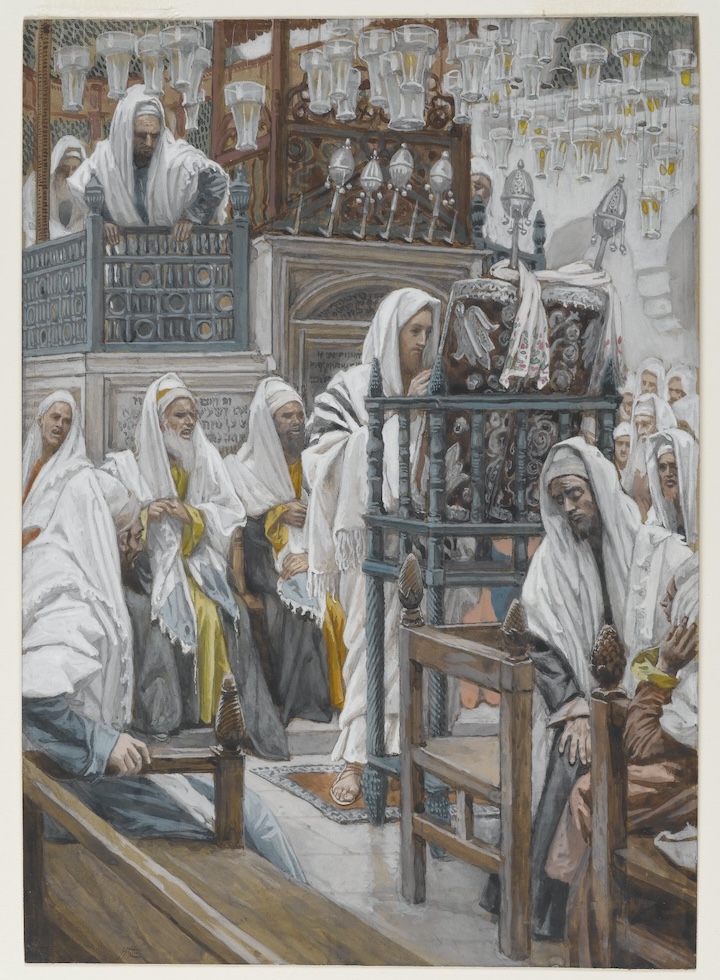Today’s Gospel (Mark 1:21-28) tells us that the people were “astonished” and “amazed.” They were “astonished at his teaching, for he taught them as one having authority and not as the scribes.” They “were amazed and asked one another, ‘What is this? A new teaching with authority. He commands even the unclean spirits, and they obey him.’” We shouldn’t pass over this astonishment and amazement as if, of course, that’s what Jesus does, but rather turn our attention to what caused it.
Authority is at the center of our Lord’s life and mission, and the flashpoint of his conflict with Israel’s leaders. The legitimacy of his public life – and, indeed, of his very Person – comes down to this one question: “By what authority are you doing these things, or who gave you this authority to do them?” (Mark 11:28)
The chief priests, scribes, and elders ask that question towards the end of Jesus’ public life. But the issue was engaged from the start. Early in his Galilean ministry, under the critical eyes of the scribes and Pharisees, Jesus heals the paralytic – to show that “the Son of Man has authority to forgive sins on earth.” (Mark 2:10) That is, he has divine authority.
In John’s Gospel, his public ministry begins with the question about his authority over the Temple: “What sign can you show us for doing this?” (John 2:18) In response, Jesus himself establishes the evidence to be given, the proof that he has authority even over the Temple: “Destroy this temple and in three days I will raise it up.” (John 2:19) Thus, his resurrection is promised as the proof of his divine authority.
By what authority? That’s the crucial question. Now, the modern ear might hear it as a rhetorical question that dismisses the notion of authority altogether. On the contrary, our Lord’s contemporaries appreciated the reality of authority, even if they abused it (as do men of every age). They understood that there is a divine authority and authority in this world. They just had difficulty believing that the carpenter from Nazareth possessed it.
Nor should we think of Christ’s authority as something He merely possesses (as if He could somehow not possess it). It is central to His mission and public life because it is part of Him, part of His being the Son of God. He is the authoritative Word of the Father, the Author of all things. He authoritatively and authentically reveals the Father because He is eternally in the bosom of the Father.

This also points to the purpose of Christ’s authority. It is directed to our good, which is ultimately our reconciliation with the Father. As we see in the synagogue in Capernaum, Jesus exercises His authority to teach and to heal; to communicate truth and grace. Truth to enlighten and grace to sanctify. The greatest truth He communicates is the revelation of God as Father and of himself as the eternal Son. The greatest grace He communicates is a share in the Father’s life, making us “partakers of the divine nature.” (2 Peter 1:4)
As Jesus receives authority from the Father, so he grants the Church a participation in his authority. “As the Father has sent me, so I send you.” (John 20:21) The Church exists as the continuing presence of Christ that communicates the twofold gift of truth and grace. She teaches authoritatively, as the authentic voice of Christ echoing from the bosom of the Father throughout history and throughout the world. She communicates the grace of Christ that casts out demons, frees souls from the dominion of evil, and imbues them with His own life.
The reality and gravity of the Church’s authority should humble her shepherds who exercise it in the name of Christ. Their task isn’t to reinterpret the Gospel or to shift any paradigms, but faithfully to convey the truth and grace that comes from the Father.
One of modern thought’s most nefarious accomplishments is the conflating of authority and power. It’s all just a power grab, we’re led to believe. Whoever has authority is by that very fact an oppressor. Authority is always authoritarian. So, the authority of institutions and of the past itself must be dismantled because it’s only the instrument of oppressors.
Like all revolutions, the one against authority eventually eats its own. Having rejected the principle of authority, modern thought came to doubt the authority of thought itself. (Is there any discipline in universities that’s not deemed oppressive and needing to be deconstructed?) Ironically, it’s the Catholic Church – that most authoritarian and oppressive institution – that steps in and confirms that, yes, in fact, the human mind is capable of grasping the truth. The Church’s authority comes to free the human mind from the shackles of skepticism.
“We do not want this man to be our king.” (Luke 19:22) Those words from one of our Lord’s most haunting parables express the self-destructive rejection of Christ’s authority. The faithful soul, however, far from resenting that authority, desires to be under it. We know that, but for His authority over us, we would still be in error and sin. The more Christ reigns over us with His authority, the more clearly we see the truth and the more freely we live by grace. Further, the more we submit to the authority of His truth and grace, the more we become ourselves people who speak and act with authority.















